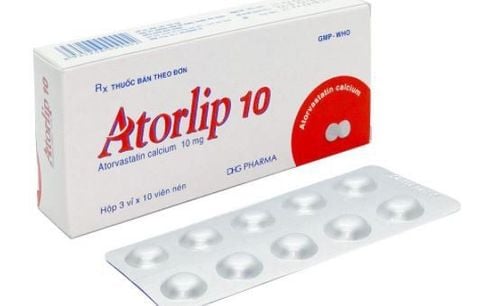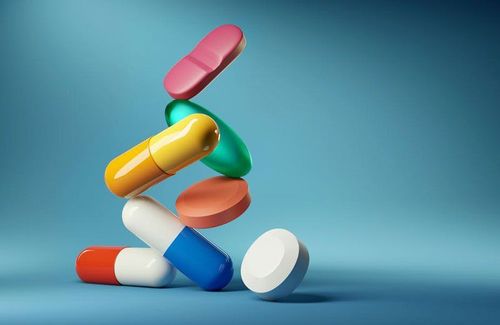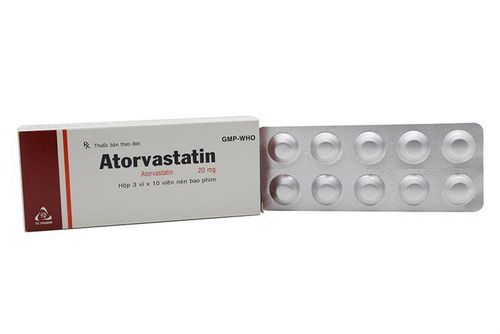This is an automatically translated article.
Atorhasan 20 contains the active ingredient Atorvastatin calcium trihydrate. So what disease does Atorhasan 20 treat? Let's learn about the use of Atorhasan 20 in the article below.1. What is Atorhasan 20?
Atorhasan 20 contains the main active ingredient, Atorvastatin calcium trihydrate, which belongs to the Statin group of drugs that help regulate blood lipids (dyslipidemia).
2. Indications of the drug Atorhasan 20 Atorhasan is indicated in the following cases:
Treatment of dyslipidemia; As an adjunct to dietary therapy in adults and children >10 years of age with primary hypercholesterolemia and mixed dyslipidemia, heterozygous familial hypercholesterolemia, and hypertriglyceridemia. Reduction of total cholesterol and LDL-cholesterol in adults with homozygous familial hypercholesterolemia as an adjunct to other lipid-lowering therapies. Prevention of cardiovascular events: In adults without evidence of coronary heart disease but with multiple risk factors (eg, age, smoking, high blood pressure, low HDL cholesterol, family history of cardiovascular disease). Coronary artery disease): Atorvastatin in combination with dietary therapy to reduce the risk of myocardial infarction, stroke, undergoing coronary revascularization, and angina. In patients with type 2 diabetes without clinical manifestations of coronary heart disease but with known risk factors (eg, retinopathy, albuminuria, smoking, hypertension), atorvastatin in combination with therapy diet to reduce the risk of heart attack and stroke; In patients with clinical manifestations of coronary heart disease, atorvastatin, in combination with oral therapy, has been shown to reduce the risk of nonfatal myocardial infarction, stroke, undergoing coronary revascularization, and angina. chest and reduce the risk of hospitalization for congestive heart failure .
3. How to take Atorhasan 20
How to use: Take the medicine with 1 glass of water, you can use it at any time of the day, regardless of the meal. You should fix the time to take the medicine each day.
If you are taking other cholesterol-lowering drugs containing Cholestyramine or Colestipol concurrently, you should take Atorhasan 20 2 hours after taking these drugs.
Dosage:
In adults and children 10 years of age and older: The starting dose is usually 10mg/time/day. The doctor may increase the dose to achieve the best treatment effect, the time to adjust the dose is usually at least 4 weeks apart. Do not use Atorhasan 20 if you are taking medicines containing Cyclosporin, Tipranavir + Ritonavir and Telaprevir; Do not use more than 20mg/day when combining drugs containing Clarithromycin, Itraconazole, Darunavir + Ritonavir, Fosamprenavir, Fosamprenavir + Ritonavir, Saquinavir + Ritonavir; Do not use more than 40mg/day when combining drugs containing nelfinavir, boceprevir; Inform your doctor if you have liver or kidney disease or are taking Lopinavir + Ritonavir combination medicine as dose adjustment may be required in these cases; Atorhasan 20 should not be used in patients with advanced liver disease. 4. Undesirable effects of the drug Atorhasan 20
Some unwanted effects may be encountered when taking Atorhasan 20 such as:
Common: Rhinitis, sore throat, nosebleeds, allergic reactions, increased creatine kinase, headache, increased blood sugar, nausea, bloating, constipation, indigestion, diarrhea, muscle pain, joint pain, back pain, abnormal liver function tests; Uncommon: Anorexia, weight gain, hypoglycemia, insomnia, nightmares, dizziness, memory impairment, numbness in fingers and toes, decreased sensation, altered taste, blurred vision, buzzing ears, vomiting, belching, upper and lower abdominal pain, hepatitis , pancreatitis, skin rash, pruritus, urticaria, hair loss, neck pain, muscle weakness, fatigue, weakness, weakness, chest pain, edema, fever, positive white blood cell test; Rare: Visual disturbances, biliary obstruction (yellowing of the skin or eyes), tendon damage, unusual bleeding or bruising; Some side effects in children: Headache, abdominal pain, abnormal liver function tests, increased phosphorus creatinkinase (common).
5. Contraindications of Atorhasan 20
Atorhasan 20 is contraindicated in patients:
Hypersensitivity to any ingredient of the drug; Having active liver disease; Unexplained persistent and abnormal liver function test parameters; Are taking drugs containing cyclosporin, telaprevir, combination tipranavir + ritonavir; Women of reproductive age not using appropriate contraception; Pregnant women, planning to become pregnant; Breastfeeding women. 6. Precautions when using Atorhasan 20
Before taking Atorhasan 20 drug, inform the doctor if the patient has impaired kidney function, hypothyroidism, personal or family history of myopathy genetics, history of myopathy due to statin or fibrate use, history of liver disease or heavy alcohol consumption, advanced age (>70 years); During the use of Atorhasan 20, it is necessary to notify the doctor if there are muscle symptoms such as muscle pain, muscle stiffness, muscle weakness...; Conduct liver function tests before starting the drug and then if necessary (e.g., signs suggestive of liver injury); There have been reports of (rare) interstitial lung disease in patients taking statins, particularly during prolonged therapy. Notify your doctor if you experience symptoms such as shortness of breath, cough without phlegm, weakness (fatigue, weight loss, fever); There is evidence that statins raise blood sugar, increasing the risk of diabetes. Inform your doctor immediately if you have risk factors for diabetes (hyperglycemia, obesity, hypertriglyceridemia, high blood pressure; Atorhasan 20 contains lactose excipients, caution should be used in this disease.) Patients with diseases of intolerance to certain sugars (glucose, galactose,...); Ability to drive vehicles and operate machines: Atorhasan 20 drug does not usually affect this ability; Pregnant women : Do not use Atorhasan 20 in pregnant or potentially pregnant women. Its inhibitory effect on cholesterol synthesis may harm the development of the fetus; Women of reproductive age need to use it. Use appropriate methods of contraception while taking the drug.If pregnancy is detected, discontinue the drug and notify the physician; Lactation: It is not known whether the drug passes into breast milk. risk of serious adverse events in the neonate, do not take Atorhasan 20 if you are breastfeeding.In summary, Atorhasan 20 is indicated in the treatment of treatment of dyslipidemia, prevention of cardiovascular events... To ensure safety and maximize the effectiveness of treatment, patients should take the drug under the guidance of a prescribing doctor.
Please dial HOTLINE for more information or register for an appointment HERE. Download MyVinmec app to make appointments faster and to manage your bookings easily.













